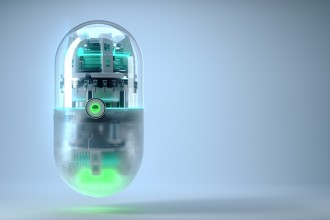-
8.Conclusion:
1. CRISPR-Cas9: Rewriting the Genetic Code:
One of the most groundbreaking biotechnological advancements is CRISPR-Cas9, a powerful gene-editing tool that allows scientists to precisely modify DNA sequences. With its high efficiency and ease of use, CRISPR-Cas9 has opened doors to numerous applications, including disease treatment, agriculture, and bioengineering. It holds the potential to cure genetic disorders, enhance crop productivity, and even eradicate mosquito-borne diseases.
2. Synthetic Biology: Designing Life:
Synthetic biology combines biology and engineering principles to design and construct artificial biological systems. Researchers can now engineer organisms to produce valuable compounds, such as pharmaceuticals, biofuels, and sustainable materials. Synthetic biology holds immense promise for personalized medicine, where tailored therapies can be created to target specific diseases and individual patient needs.
3. Gene Therapy: Treating Inherited Disorders:
Gene therapy has emerged as a revolutionary approach to treating genetic diseases. By introducing functional genes into a patient's cells, scientists can correct genetic mutations and restore normal cellular function. Recent successes in gene therapy have provided hope for previously untreatable conditions, such as spinal muscular atrophy and certain types of inherited blindness.
4. Organ-on-a-Chip Technology: Advancing Drug Development:
Organ-on-a-chip technology recreates the microenvironment of human organs on small devices, allowing scientists to study organ function and test the effects of drugs without the need for animal or human trials. This breakthrough technology has the potential to accelerate drug discovery, reduce costs, and pave the way for personalized medicine.
5. Microbiome Research: Unlocking the Power of Our Inner Ecosystem:
The human microbiome, consisting of trillions of microorganisms living in and on our bodies, plays a crucial role in our health and well-being. Biotechnology has enabled in-depth exploration of the microbiome, leading to breakthroughs in understanding its impact on various diseases, immune system function, and mental health. Manipulating the microbiome may hold the key to novel treatments for conditions such as inflammatory bowel disease, allergies, and even neurological disorders.
6. Tissue Engineering and Regenerative Medicine: Growing New Solutions:
Tissue engineering and regenerative medicine aim to repair or replace damaged tissues and organs by using cells, biomaterials, and growth factors. Scientists have made impressive strides in growing functional tissues, such as skin, cartilage, and even organs like the heart and liver. These advancements bring hope for patients in need of organ transplants and offer alternatives to traditional transplantation methods.
The Future of Biotechnology:
As biotechnology continues to evolve, the possibilities are endless. The convergence of biotechnology with other cutting-edge fields like artificial intelligence, nanotechnology, and big data analysis holds tremendous potential for even more transformative breakthroughs. Advancements in personalized medicine, targeted therapies, sustainable agriculture, and environmental conservation are just a glimpse of the bright future biotechnology promises.
Conclusion:
Biotechnology breakthroughs are reshaping the boundaries of science and medicine, offering unprecedented opportunities to improve human health, enhance sustainability, and transform industries. From gene editing to tissue engineering, these advancements hold the potential to revolutionize the way we diagnose, treat, and prevent diseases, while also addressing global challenges. Embracing the power of biotechnology, we stand on the brink of a new erawhere scientific discoveries intersect with practical applications. The biotechnology breakthroughs we've explored, including CRISPR-Cas9, synthetic biology, gene therapy, organ-on-a-chip technology, microbiome research, and tissue engineering, are just the tip of the iceberg.
Looking ahead, the future of biotechnology is filled with exciting prospects. As researchers delve deeper into understanding the complexities of the human genome, we can anticipate more precise gene editing techniques and tailored therapies that combat genetic disorders at their root. The development of advanced biomaterials and 3D printing technologies will enable the creation of fully functional organs, reducing organ transplant waiting lists and providing hope to countless patients.
Furthermore, the integration of artificial intelligence and big data analytics will enhance our understanding of complex biological systems, facilitating the discovery of novel treatments and the acceleration of drug development. Biotechnology will also play a vital role in addressing global challenges, such as food security and environmental sustainability, through advancements in agricultural biotechnology, biofuels, and waste management.
In conclusion, biotechnology breakthroughs are revolutionizing the world we live in, transforming healthcare, agriculture, and other industries. These advancements hold immense potential to improve lives, alleviate suffering, and create a more sustainable future. By embracing the power of biotechnology and supporting continued research and innovation, we can look forward to a world where scientific progress and human well-being go hand in hand.
Remember to stay tuned to the latest developments in biotechnology as we embark on an exciting journey towards a brighter, healthier, and more sustainable future.
Quickscout
Looking for suitable
technology providers?
Start scouting!







